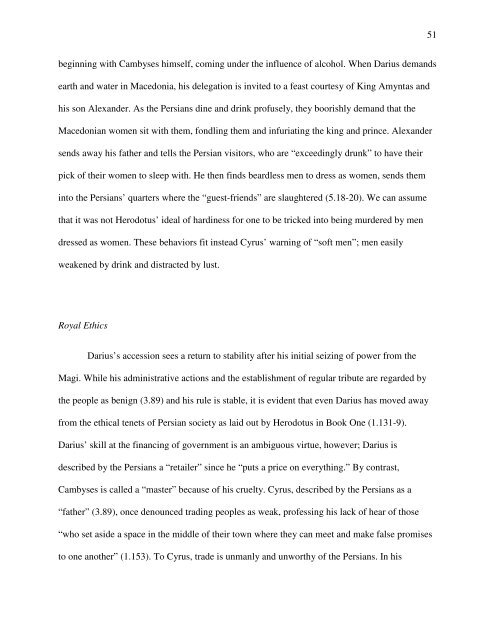The Old and the Restless - The Egyptians and the Scythians in Herodotus' Histories by Robert J. Hagan
You also want an ePaper? Increase the reach of your titles
YUMPU automatically turns print PDFs into web optimized ePapers that Google loves.
51<br />
beg<strong>in</strong>n<strong>in</strong>g with Cam<strong>by</strong>ses himself, com<strong>in</strong>g under <strong>the</strong> <strong>in</strong>fluence of alcohol. When Darius dem<strong>and</strong>s<br />
earth <strong>and</strong> water <strong>in</strong> Macedonia, his delegation is <strong>in</strong>vited to a feast courtesy of K<strong>in</strong>g Amyntas <strong>and</strong><br />
his son Alex<strong>and</strong>er. As <strong>the</strong> Persians d<strong>in</strong>e <strong>and</strong> dr<strong>in</strong>k profusely, <strong>the</strong>y boorishly dem<strong>and</strong> that <strong>the</strong><br />
Macedonian women sit with <strong>the</strong>m, fondl<strong>in</strong>g <strong>the</strong>m <strong>and</strong> <strong>in</strong>furiat<strong>in</strong>g <strong>the</strong> k<strong>in</strong>g <strong>and</strong> pr<strong>in</strong>ce. Alex<strong>and</strong>er<br />
sends away his fa<strong>the</strong>r <strong>and</strong> tells <strong>the</strong> Persian visitors, who are “exceed<strong>in</strong>gly drunk” to have <strong>the</strong>ir<br />
pick of <strong>the</strong>ir women to sleep with. He <strong>the</strong>n f<strong>in</strong>ds beardless men to dress as women, sends <strong>the</strong>m<br />
<strong>in</strong>to <strong>the</strong> Persians’ quarters where <strong>the</strong> “guest-friends” are slaughtered (5.18-20). We can assume<br />
that it was not Herodotus’ ideal of hard<strong>in</strong>ess for one to be tricked <strong>in</strong>to be<strong>in</strong>g murdered <strong>by</strong> men<br />
dressed as women. <strong>The</strong>se behaviors fit <strong>in</strong>stead Cyrus’ warn<strong>in</strong>g of “soft men”; men easily<br />
weakened <strong>by</strong> dr<strong>in</strong>k <strong>and</strong> distracted <strong>by</strong> lust.<br />
Royal Ethics<br />
Darius’s accession sees a return to stability after his <strong>in</strong>itial seiz<strong>in</strong>g of power from <strong>the</strong><br />
Magi. While his adm<strong>in</strong>istrative actions <strong>and</strong> <strong>the</strong> establishment of regular tribute are regarded <strong>by</strong><br />
<strong>the</strong> people as benign (3.89) <strong>and</strong> his rule is stable, it is evident that even Darius has moved away<br />
from <strong>the</strong> ethical tenets of Persian society as laid out <strong>by</strong> Herodotus <strong>in</strong> Book One (1.131-9).<br />
Darius’ skill at <strong>the</strong> f<strong>in</strong>anc<strong>in</strong>g of government is an ambiguous virtue, however; Darius is<br />
described <strong>by</strong> <strong>the</strong> Persians a “retailer” s<strong>in</strong>ce he “puts a price on everyth<strong>in</strong>g.” By contrast,<br />
Cam<strong>by</strong>ses is called a “master” because of his cruelty. Cyrus, described <strong>by</strong> <strong>the</strong> Persians as a<br />
“fa<strong>the</strong>r” (3.89), once denounced trad<strong>in</strong>g peoples as weak, profess<strong>in</strong>g his lack of hear of those<br />
“who set aside a space <strong>in</strong> <strong>the</strong> middle of <strong>the</strong>ir town where <strong>the</strong>y can meet <strong>and</strong> make false promises<br />
to one ano<strong>the</strong>r” (1.153). To Cyrus, trade is unmanly <strong>and</strong> unworthy of <strong>the</strong> Persians. In his
















